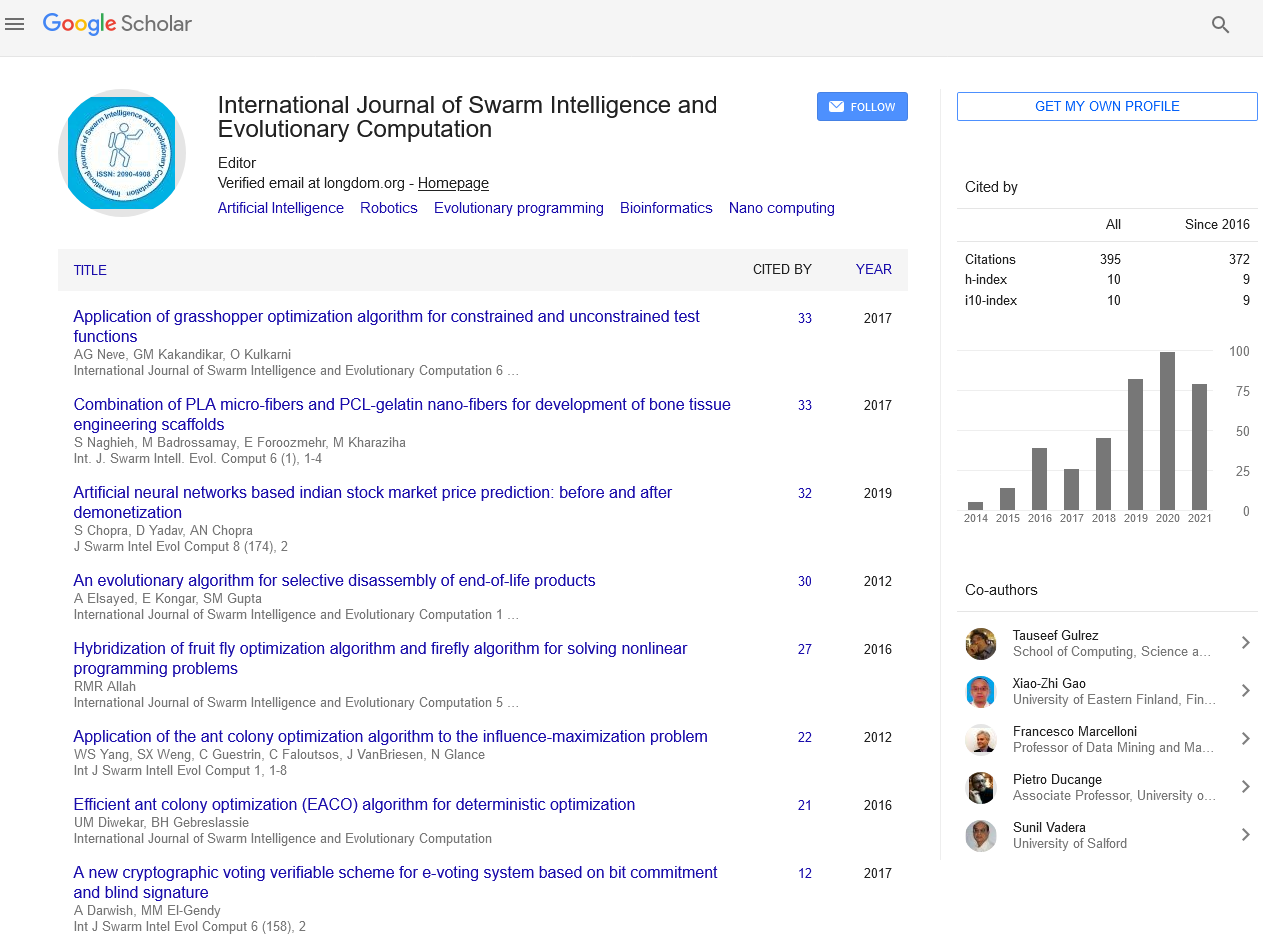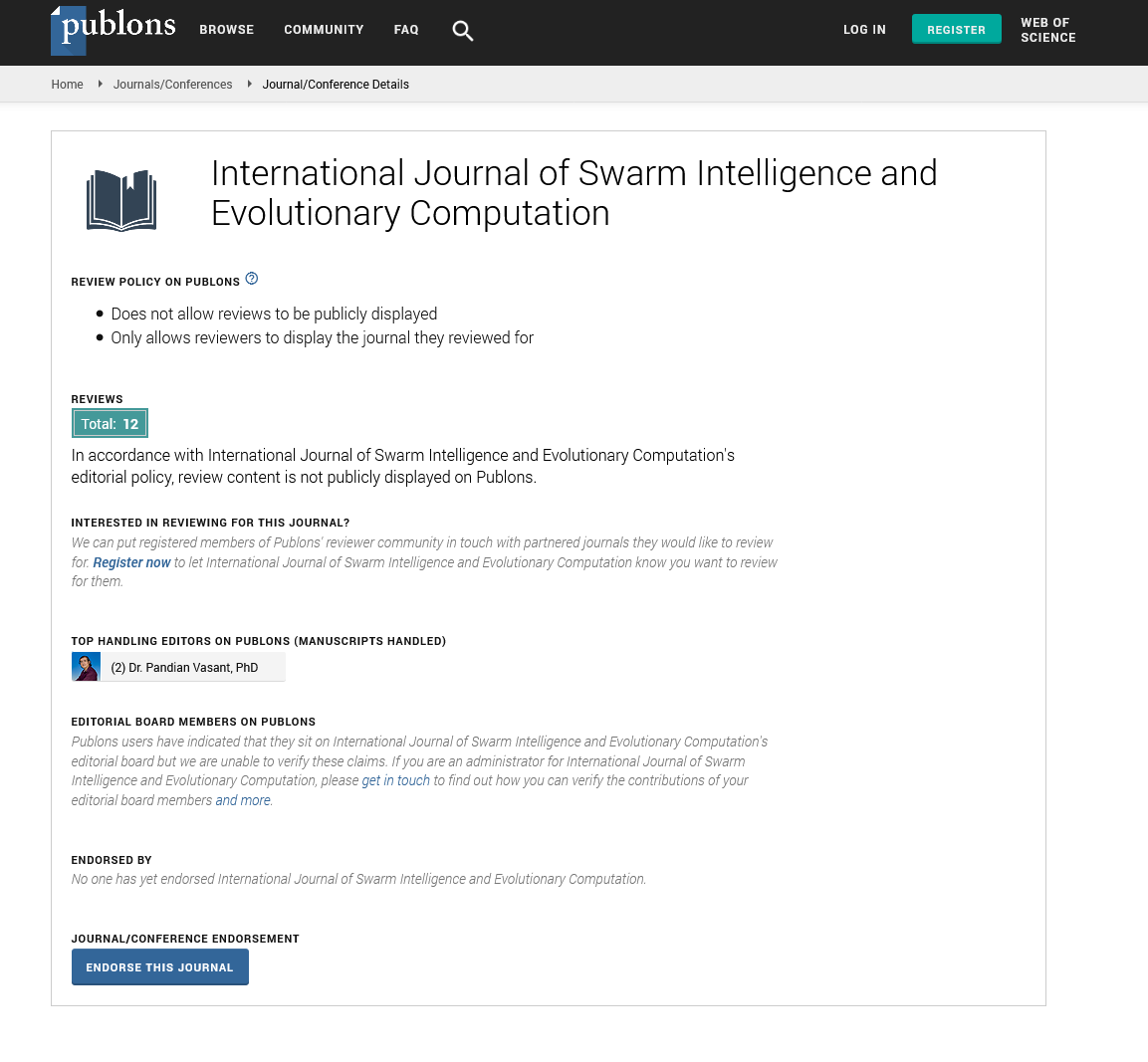Indexed In
- Genamics JournalSeek
- RefSeek
- Hamdard University
- EBSCO A-Z
- OCLC- WorldCat
- Publons
- Euro Pub
- Google Scholar
Useful Links
Share This Page
Journal Flyer

Open Access Journals
- Agri and Aquaculture
- Biochemistry
- Bioinformatics & Systems Biology
- Business & Management
- Chemistry
- Clinical Sciences
- Engineering
- Food & Nutrition
- General Science
- Genetics & Molecular Biology
- Immunology & Microbiology
- Medical Sciences
- Neuroscience & Psychology
- Nursing & Health Care
- Pharmaceutical Sciences
Perspective - (2022) Volume 11, Issue 9
Significance of Artificial Intelligence in Data Science
Hein Chung*Received: 17-Aug-2022, Manuscript No. SIEC-22-18415; Editor assigned: 19-Aug-2022, Pre QC No. SIEC-22-18415 (PQ); Reviewed: 05-Sep-2022, QC No. SIEC-22-18415; Revised: 13-Sep-2022, Manuscript No. SIEC-22-18415 (R); Published: 22-Sep-2022, DOI: 10.35248/2090-4908.22.11.274
Description
The fields of data science and Artificial Intelligence (AI) are inextricably linked. As shown in the graphic below, all of them share data as a common element. Data engineering is the first step since it deals with the extraction, transformation, and storage of data. Artificial intelligence in data science applications operates on processed data and so can function only after the raw data has been engineered.
Artificial intelligence is crucial in improving data science capabilities. The following points describe the role of AI in data science:
Machine learning is a supervised version created by combining data science with artificial intelligence, in which a little amount of data is fed into the system to forecast the probability. Machine learning algorithms such as regression and classification are employed for proper predictive analysis.
Understanding the function of artificial intelligence in data science, although the terms data science and artificial intelligence are used interchangeably because of how they work, artificial intelligence is a tool for data science. Data science does not fully represent artificial intelligence because it only works with predictive analysis and employs machine learning technologies. Machine learning is merely a subset of artificial intelligence, and AI can provide far more complicated analytical tools.
The goal of data science is to identify hidden trends in massive amounts of data. This discipline is important for obtaining a deeper knowledge by extracting raw data, processing it, and analyzing it. This manner, the massive amounts of data can provide meaningful insights from which to make critical business decisions. On the other hand, artificial intelligence can be used to manage data independently. This suggests that you can eliminate human dependency from your task and fully automate.
Goals
The primary purpose of data science is to complete an acceptable problem statement, record business needs, and design a workable solution using data analytics and machine learning models. Furthermore, data scientists visualize data to present the insights created by their recommended solution.
The primary goal of artificial intelligence is to mimic human intellect using computers so that machines can make intelligent decisions in difficult settings. AI Professionals seek to design new algorithms, refine existing neural networks, and execute data automation for processing large amounts of data to reach this goal.
Fundamental Technologies
To analyse and manipulate massive datasets, data science employs a variety of statistical approaches. This domain uses machine learning algorithms to identify actionable insights from source data. Data scientists use tools such as Tableau, Python Programming Language (PPL), MATLAB, Tensor flow statistics, Natural Language Processing (NLP), and many others to achieve their objectives.
Artificial intelligence is mostly based on machine learningpowered algorithms that are tailored to certain tasks. AI professionals employ a number of methods to improve the process of teaching computers to make decisions.
Significance
AI has tremendous potential to make the world a better place. Human needs will always be as vital as they have been; it will be up to them to guarantee that AI does not become uncontrollable. Furthermore, it examined the functions of artificial intelligence in data science and compared the two technologies. Artificial intelligence is important in data science because it provides sophisticated tools for effective predictive analysis as well as proper parameters for data engineering to be applied to software.
Citation: Chung H (2022) Significance of Artificial Intelligence in Data Science. Int J Swarm Evol Comput. 11:274.
Copyright: © 2022 Chung H. This is an open-access article distributed under the terms of the Creative Commons Attribution License, which permits unrestricted use, distribution, and reproduction in any medium, provided the original author and source are credited.


